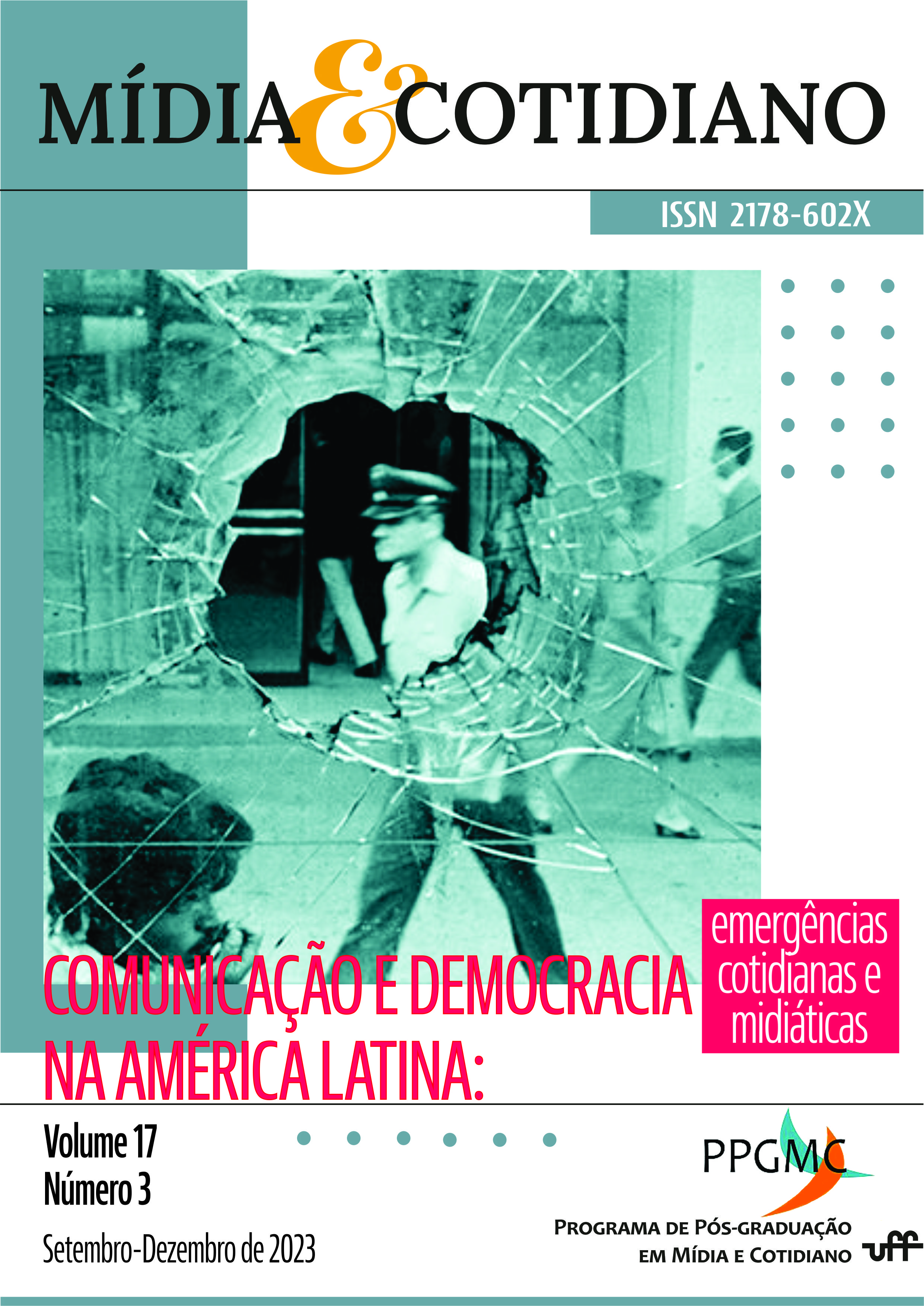Violence against journalists and the quality of democracy: evidence from Latin America in comparative analysis
DOI:
https://doi.org/10.22409/rmc.v17i3.58688Keywords:
media opening, media and democracy, journalism, violenceAbstract
This article presents the results of an investigation guided by the following question: How does violence against journalists relate to the quality of democracy in Latin America? This issue is grounded in the conceptual debate surrounding media opening, a process associated with the idea of democratization across two dimensions: the representation of social diversity and independence from official control. Among the barriers to this process is violence against journalists. This debate was empirically operationalized through the application of statistical techniques in a comparative analysis of the variable-oriented and theory-oriented nature, with a large number of cases (large n). The findings indicate that as violence against journalists increases, the level of democracy quality decreases, with a greater impact of this dimension on the former, particularly when considering the Latin American context.
Downloads
References
DAHL, Robert A. Poliarquia: participação e oposição. São Paulo (SP): EDUSP, 2005.
DAHL, Robert A.; SHAPIRO, Ian. On democracy. 2nd edition. New Haven: Yale University Press, 2015.
DANCEY, Christine P.; REIDY, John. Statistics without maths for psychology. Seventh Edition. New York: Pearson, 2017.
DOMINGUES-DA-SILVA, Juliano; BARROS, Chalini Torquato Gonçalves de. O Que Significa “Democratização da Comunicação”? Limites e possibilidades de enquadramentos teóricos a partir de modelos de democracia. Revista Política Hoje - ISSN: 0104-7094, v. 22, n. 1, 2014. Disponível em: <https://periodicos.ufpe.br/revistas/politicahoje/article/view/3774>. Acesso em: 7 nov. 2018.
DOMINGUES-DA-SILVA, Juliano; ZAVERUCHA, Jorge; FIGUEIREDO FILHO, Dalson; et al. Mais concentração de propriedade de Mídia, menos democracia? Testando possibilidades de associação entre variáveis. Intercom: Revista Brasileira de Ciências da Comunicação, v. 38, n. 1, p. 65–84, 2015.
EIU - THE ECONOMIST INTELLIGENCE UNIT. Democracy Index 2017. Disponível em: <http://www.eiu.com/topic/democracy-index>. Acesso em: 16 nov. 2018.
FRANKFORT-NACHMIAS, Chava; LEON-GUERRERO, Anna. Social statistics for a diverse society. 6th ed. Los Angeles: Sage/Pine Forge Press, 2011.
GRANATO, Jim; SCIOLI, Frank. Puzzles, Proverbs, and Omega Matrices: The Scientific and Social Significance of Empirical Implications of Theoretical Models (EITM). Perspectives on Politics, v. 2, n. 02, 2004. Disponível em: <http://www.journals.cambridge.org/abstract_S1537592704040186>. Acesso em: 5 nov. 2018.
GRIMM, Laurence G.; YARNOLD, Paul R. (Orgs.). Reading & Understanding Multivariate Statistics. Washington, D.C: American Psychological Association, 1995.
HALLIN, Daniel C.; MANCINI, Paolo. Comparing media systems: three models of media and politics. Cambridge ; New York: Cambridge University Press, 2004. (Communication, society, and politics).
HELMKE, Gretchen; LEVITSKY, Steven. Informal Institutions and Comparative Politics: A Research Agenda. Perspectives on Politics, v. 2, n. 4, p. 725–740, 2004.
HELMKE, Gretchen; LEVITSKY, Steven (Orgs.). Informal Institutions and Democracy: Lessons from Latin America. Baltimore: Johns Hopkins University Press, 2006.
HITE, Katherine; CESARINI, Paola (Orgs.). Authoritarian Legacies and Democracy in Latin America and Southern Europe. Notre Dame, Ind: University of Notre Dame Press, 2004.
HUGHES, Sallie. Newsrooms in conflict: journalism and the democratization of Mexico. Pittsburgh, PA: University of Pittsburgh Press, 2006. (Pitt Latin American series).
HUGHES, Sallie; LAWSON, Chappell. The Barriers to Media Opening in Latin America. Political Communication, v. 22, n. 1, p. 9–25, 2005.
LANDMAN, Todd. Issues and methods in comparative politics: an introduction. Fourth edition. London ; New York: Routledge, Taylor & Francis Group, 2017.
LAWSON, Chappell. Building the Fourth Estate – Democratization & the Rise of a Free Press in Mexico. Edição: First. Berkeley: University of California Press, 2002.
MITCHELL, Mark L.; JOLLEY, Janina M. Research design explained. 4th ed. Fort Worth, TX: Harcourt College Publishers, 2000.
PORTO, Mauro Pereira (Org.). Media power and democratization in Brazil: TV Globo and the dilemmas of political accountability. First issued in paperback. New York: Routledge, 2013. (Routledge advances in internationalizing media studies, 8).
RAGIN, Charles C. The comparative method: moving beyond qualitative and quantitative strategies. Oakland: University of California Press, 2014.
RELLY, Jeannine E.; GONZÁLEZ DE BUSTAMANTE, Celeste. Global and Domestic Networks Advancing Prospects for Institutional and Social Change: The Collective Action Response to Violence Against Journalists. Journalism & Communication Monographs, v. 19, n. 2, p. 84–152, 2017.
RICE, Ronald E. (Org.). Media Ownership: Research and Regulation. Cresskill, NJ: Hampton Press, 2007.
STEVENS, James. Applied multivariate statistics for the social sciences. 3rd ed. Mahwah, N.J: Lawrence Erlbaum Associates, 1996.
TEORELL, Jan; DAHLBERG, Stefan; HOLMBERG, Sören; et al. The Quality of Government Standard Dataset, version Jan20. 2020. Disponível em: <http://www.qog.pol.gu.se doi:10.18157/qogstdjan20>. Acesso em: 8 nov. 2018.
WAISBORD, Silvio. Antipress Violence and the Crisis of the State. Harvard International Journal of Press/Politics, v. 7, n. 3, p. 90–109, 2002.
Downloads
Published
How to Cite
Issue
Section
License
Aviso de Direito Autoral Creative Commons
1. Política para Periódicos de Acesso Livre
Autores que publicam nesta revista concordam com os seguintes termos:- Autores mantém os direitos autorais e concedem à revista o direito de primeira publicação, com o trabalho simultaneamente licenciado sob a Licença Creative Commons Attribution que permite o compartilhamento do trabalho com reconhecimento da autoria e publicação inicial nesta revista.
- Autores têm autorização para assumir contratos adicionais separadamente, para distribuição não-exclusiva da versão do trabalho publicada nesta revista (ex.: publicar em repositório institucional ou como capítulo de livro), com reconhecimento de autoria e publicação inicial nesta revista.
- Autores têm permissão e são estimulados a publicar e distribuir seu trabalho online (ex.: em repositórios institucionais ou na sua página pessoal) a qualquer ponto antes ou durante o processo editorial, já que isso pode gerar alterações produtivas, bem como aumentar o impacto e a citação do trabalho publicado (Veja O Efeito do Acesso Livre).


